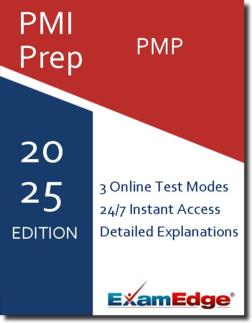PMI PMP (PMP) Practice Tests & Test Prep by Exam Edge - FAQ
Based on 40 Reviews
- Real Exam Simulation: Timed questions and matching content build comfort for your PMI PMP test day.
- Instant, 24/7 Access: Web-based PMI Project Management Professional practice exams with no software needed.
- Clear Explanations: Step-by-step answers and explanations for your PMI exam to strengthen understanding.
- Boosted Confidence: Reduces anxiety and improves test-taking skills to ace your PMI Project Management Professional (PMP).

Why should I use Exam Edge to prepare for the PMI Project Management Professional Exam?
FAQ's for Exam Edge PMI Project Management Professional practice tests
- Comprehensive content: Exam Edge's PMI Project Management Professional practice tests are created specifically to prepare you for the real exam. All our PMI PMP practice test questions parallel the topics covered on the real test. The topics themselves are covered in the same proportions as the real test too, based on outlines provided by the Project Management Institute in their PMI PMP test guidelines.
- Realistic practice: Our PMI PMP practice exams are designed to help familiarize you with the real test. With the same time limits as the real exam, Our PMI practice tests enable you to practice your pacing and time management ahead of test day.
- Detailed explanations: As you complete your practice tests, we show you which questions you answered correctly and which ones you answered incorrectly, in addition to providing you with detailed step-by-step explanations for every single PMI Project Management Professional practice exam question.
- Performance insights: After you complete a practice test, we provide you with your raw score (how many you answered correctly) and our estimate of the PMI PMP score you would have received if you had taken the real test.
- Ease of access: Because all Our PMI practice tests are web-based, there is no software to install. You can take PMI PMP practice exams on any device with access to the internet, at any time.
- Flexible use: If you must pause while taking one of Our PMI practice exam, you can continue right where you left off. When you continue the test, you will start exactly where you were, and with the same amount of time you had remaining.
- Thousands of unique questions: We offer 5 different online practice exams with 500 unique questions to help you prepare for your PMI Project Management Professional !
- Low cost: The cost of ordering 5 practice tests is less than the cost of taking the real PMI PMP test. In other words, it would be less expensive to order 5 practice tests than to retake the real PMI Project Management Professional exam!
- Our trusted reputation: As a fully accredited member of the Better Business Bureau, we uphold the highest level of business standards. You can rest assured that we maintain all of the BBB Standards for Trust.
- Additional support: If you need additional help, we offer specialized tutoring. Our tutors are trained to help prepare you for success on the PMI Project Management Professional exam.
What score do I need to pass the PMI PMP Exam?
To pass the PMI Project Management Professional test you need a score of 75.
The range of possible scores is 0 to 100.
How do I know the practice tests are reflective of the actual PMI Project Management Professional ?
At Exam Edge, we are proud to invest time and effort to make sure that Our PMI practice tests are as realistic as possible. Our practice tests help you prepare by replicating key qualities of the real test, including:
- The topics covered
- The level of difficulty
- The maximum time-limit
- The look and feel of navigating the exam
Do you offer practice tests for other Project Management Institute subjects?
Yes! We offer practice tests for 7 different exam subjects, and there are 35 unique exams utilizing 3500 practice exam questions. Every subject has a free sample practice test you can try too!
PMI Certified Associate in Project Management (CAPM)
Practice Tests
PMI Portfolio Management Professional
(PfMP
®
)
Practice Tests
PMI Professional in Business Analysis
(PBA
®
)
Practice Tests
PMI Program Management Professional (PgMP) (PgMP)
Practice Tests
PMI Project Management Professional (PMP)
Practice Tests
PMI Risk Management Professional
(PMI-RMP
®
)
Practice Tests
PMI Scheduling Professional
(PMI-SP
®
)
Practice Tests
To order tests, or take a sample test, for a different subject:
Click on ' Name on the Exam Name' You will be take to the orders page
How do I register for the real Project Management Institute?
For up-to-date information about registration for the Project Management Institute, refer to the Project Management Institute website.


